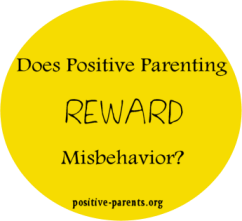Does Positive Parenting Reward Misbehavior?

This is post #3 in my “Debunking Myths about Positive Parenting” series. In post one, I debunked the myth that positive parents just want to be friends , and in post two, I set the record straight on the false assumption that we do not discipline our children . Because Positive Parenting is centered around connection, I often advocate for practices such as time-in rather than time-out when misbehavior arises and being emotionally supportive through tantrums as opposed to ignoring them.
These ideas often draw the reaction of “but isn’t that rewarding tantrums and misbehavior?!” The short answer is “no.”
The long answer is “the whole foundation of positive parenting is not based upon rewarding or punishing behavior but rather upon understanding what is driving a child’s behavior and giving the child the knowledge and skills needed to not only govern his own behavior but to grow into his own full potential as an emotionally healthy and secure adult.”
I usually give the short answer. You can see why.
However, the long answer is much more accurate, and I’d like to try to explain further so as to debunk this myth for good.
When we look at behavior in terms of something we need to reward (with the intention of getting the child to perform well again) or punish (intending to deter the behavior), then we are essentially trying to control the child. This may seem to work for a while when children are young, but control over another person is just an illusion. You can’t really control how they will act when you’re not around, and that is one of the reasons why I’ve decided to drop the act and instead teach my children how and why to control themselves. After all, that’s the end game of discipline, isn’t it? Self-discipline?
If they’re going to really absorb my words and heed my advice on how to govern themselves, then they need to be in a healthy, connected, secure relationship with me. That’s why I chose time-in over time-out, because I needed to first connect with my hurting child before I could show him a better way. I use the past tense here because my children are now too old for time-in and we’ve moved on to problem-solving . However, what I came to understand some years ago was that my connection to my children was not a reward but a lifeline. It wasn’t something I could dangle like a carrot in front of their noses, offering a sense of security, trust, and unwavering love only when they behaved well and yanking it away when their behavior was off-track. I discovered that their connection to me was, at least in part, what inspired them to do better.
Why be concerned with what is driving the child’s behavior? Does it really matter? Isn’t the goal just to make them stop the misbehavior?...continue reading at Creative Child

For more of my Positive Parenting articles featured in Creative Child Magazine, click here.
Published on September 04, 2015 07:53
No comments have been added yet.



